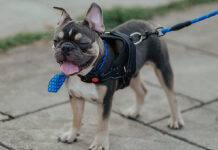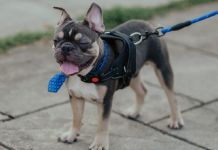The Goldendoodle is a large mixed breed dog produced by crossing a Golden Retriever with a Poodle. Many of the hybrid dogs we see today are Poodle crosses in an attempt to produce hypoallergenic dogs, however this isn’t always guaranteed.
If you suffer from allergies like millions of other Americans you might think owning a four-legged friend is out of the question, but you’d be wrong. Although many breeds are a non-starter for those with allergies, certain breeds can cause little or no reaction, step forward the hypoallergenic Goldendoodle.
Is It True, Are Goldendoodle Dogs Hypoallergenic?
It depends, most are, to varying degrees, as with any crossbreed dog there are no guarantees and if the resulting puppies of this mix inherit the Golden Retriever’s coat they can and do shed. Now it gets a bit confusing there are various types of Goldendoodle F1, F1B, F2, F2B and these generation tags can have a significant impact on the dog’s appearance, characteristics and shedding.
- F1 Goldendoodles are 50% Poodle and 50% Golden Retriever. These are only suitable for potential owners that suffer from slight allergies as they may shed lightly.
- F1B Goldendoodles are first generation doodles crossed with a Poodle. The most popular generation type, these are the best choice for people suffering from moderate to severe allergies as being 75% Poodle they are non-molting 99% of the time.
- F2 Goldendoodles are second generation doodles and are similar to F1s being equal parts of each of the parent breeds, once again they are only recommended for dog lovers with less severe allergic reactions.
- F2B These are second generation backcrosses meaning a first-generation doodle was bred with a F1B doodle. The least common type they still work well with families that suffer from moderate allergies as they shed very little if at all.
So, there’s your answer; Goldendoodles can be an allergy friendly dog breed, but caution is required when choosing your new best friend.
What does hypoallergenic actually mean?
A lot of people believe the word hypoallergenic means will not cause an allergic reaction. Not true! It actually means, a lower or reduced chance of reaction so while Goldendoodles are one of the best hypoallergenic breeds for allergy sufferers there is still a chance you may get the sneezes.
3 Reasons why the Goldendoodle is a Choice Breed among Allergy Sufferers
- Goldendoodles that have the tight curls of the Poodle are non-shedding with loose dander (skin particles) and the odd hair getting trapped before they become airborne and cause problems.
- They are a great family pet lively and intelligent they are easy to train and not as demanding as some of the more sensitive small hypoallergenic breeds.
- They are easy to housetrain. Dog allergens can be found in urine and a few of the smaller hypoallergenic breeds can be difficult to housebreak, dog pee in the home is likely to cause a reaction.
Goldendoodles and allergies – What should I do?
All dog allergens are different which is good news for allergy sufferers some are caused by dead skin, most dogs shed their skin every 4-5 days where some breeds such as Poodles, Schnauzers and Airedales shed only every 3 weeks producing less dander.
Other allergens are produced by fur, saliva or urine so it is important to remember reactions to different dogs can vary even down to different puppies in the same litter so the most important thing when bringing a canine companion into your home is to spend time with them first.
There are a couple of options you can try including:
- Arranging controlled access visits with a breeder. Some Goldendoodle breeders now offer something called the T-shirt allergy test it costs around $125 a small price to pay to know your chosen puppy will not cause a reaction.
- Find a local doodle event, there are get-togethers and fun days across the country. Spend a day with lots of these beautiful, versatile dogs and if you don’t break out in hives or spend the day wheezing a Goldendoodle could be the perfect pet for you.
5 Ways to Reduce the Risk of an Allergic Reaction from your Pooch
- Clean, clean and clean some more, vacuuming every day and wiping surfaces with a damp cloth will reduce the allergens in your home.
- Many people find allergies are worse at night-time or first thing in the morning so keep your bedroom dog-free. Create a comfortable place for your pooch to sleep in another room, it might seem a bit harsh but he really won’t mind.
- Clear the Clutter, the more stuff you have, especially fabrics like rugs, throws, cushions and drapes, the more places allergens have to hide.
- Bathe your dog regularly, this might be a bit difficult with a larger breed like the Goldendoodle but grooming every day and using dog wipes will keep those pesky allergens to a minimum.
- Medications, if you only have a slight allergic reaction to your dog, over the counter antihistamines or regular allergy shots may help, in some cases these can be reduced over a period of time.
All about the Goldendoodle – Origin of the Breed
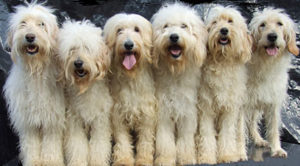
Source: EverythingDoodle.com
The Goldendoodle is not a pure-breed nor is it a mutt as some people refer to so called “designer dogs” In fact most of the breeds we are familiar with today were originally crosses. In the 1990s a few breeders in Australia and North America began crossing Golden Retrievers with standard Poodles, the purpose being to produce a guide dog suitable for people with allergies.
The appeal of these intelligent, gentle, outgoing dogs was immediate and they have seen a meteoric rise in popularity over the last 25 years with some breeders crossing with miniature Poodles to produce a smaller more manageable version suited to city-living.
Although not recognized as a pedigree dog by any of the world’s dog registries including the AKC (American Kennel Club) and UKC (United Kennel Club) there are efforts being made by dedicated breeders to standardize their type in the hope they will be accepted in the future. Despite the dedication of GANA (The Goldendoodle Association of America) the debate over whether modern hybrid dogs will ever be accepted as breeds in their own right, looks set to continue for years to come.
General Appearance
A Goldendoodles size can vary depending on which type of Poodle they have been mated with the most common is the standard size with males standing between 24-26 inches and females slightly less at 21-23 inches both weighing between 60-100 pounds.
First generation crosses can inherit the appearance of either of the parent breeds but as more Goldendoodles are crossed with each other the characteristics become more distinct, being medium sized with soft wavy- curly coats that come in a variety of colors including gold, cream, brown, apricot, red, grey and black. apricot Goldendoodles are the most popular, while black Goldendoodles are the least popular color.
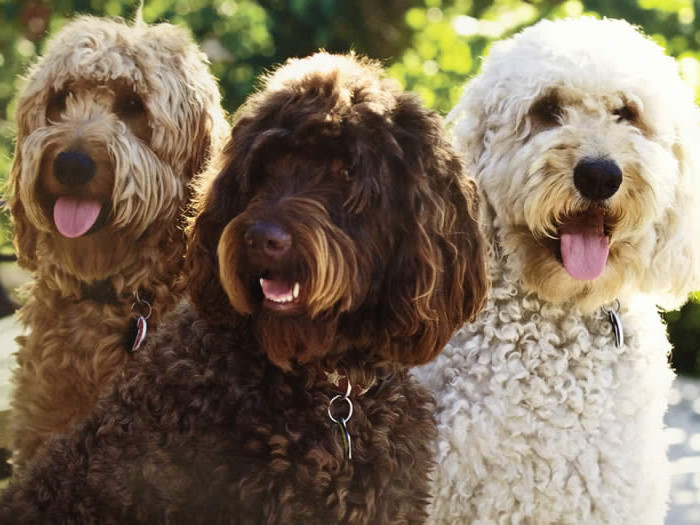
Source: EverythingDoodle.com
Temperament
The hypoallergenic Goldendoodle is the perfect choice as a family pet, cheerful, smart and outgoing they are eager to please making them easy to train and suitable for first-time dog owners. When properly socialized from an early age they are confident and get on well with both children and other pets. Like most breeds without the proper physical and mental stimulation they can be destructive and develop behavioral problems.
They need a moderate amount of exercise and as the result of 2 retrieving breeds most love water and enjoy swimming. They do well at agility and make great therapy dogs.
They are extremely social and are not for an owner who is out all day. If you can spend time with your four-legged friend and lead a relatively active lifestyle the Goldendoodle is an excellent choice.
Health
Although Golden Retrievers and Poodles suffer from various genetic health issues, crossing the 2 can result in varying degrees of hybrid vigor meaning this crossbreed is a relatively healthy breed. The Goldendoodle lifespan is around 10-13 years. This doesn’t mean breeders should not provide you with the relevant health screening and you should be aware they can be predisposed to conditions common to either parent breed including:
- Hip Dysplasia
- Cataracts
- sebaceous adenitis
- Progressive retinal atrophy
- hypothyroidism
Second and multi generation Goldendoodles are considered to be healthier but there are no guarantees where dog genetics are concerned which is why it is essential to choose a trustworthy breeder.
Food
Dogs require a healthy diet in order for them to grow strong and lead a long and active life. The food you choose depends on several factors: age, activity, size, breed, and personal choice. A puppy will have different nutritional requirements to an older dog, and a Great Dane will need a different diet compared to a Border Collie or Chihuahua.
Because Goldendoodles have varying dimensions there is no one size fits all solution and you should consider your individual pet’s requirements, their activity level, and age. Feeding them the finest quality food you can afford.
Golden Retrievers although not fussy eaters can be prone to food allergies and this can come through in some Goldendoodles. If you suspect your pooch has a food allergy talk to your vet or try one of the increasing number of hypoallergenic dog foods on the market.
Finding A Good Goldendoodle Breeder
The popularity of this lovable mixed breed has seen a rise in puppy mills and backyard breeders trying to make a quick buck they do not care about the puppy’s welfare and although this may be a cheaper option, you are taking a big risk bringing one of these puppies into your home.
If you are looking for Goldendoodle puppies for sale, finding a responsible breeder is essential if you want a healthy pup with a good temperament. A great place to look is the Goldendoodle Association of North America who have a breeders directory and numerous policies and guidelines they need to adhere too.
A reputable breeder will provide the relevant genetic screening and happily answer any questions you have about the breed and themselves. In fact, they will probably ask you just as many questions to ensure the welfare of their puppies.
3 Red Flags to Look Out for When Searching a Goldendoodle Breeder
- Many breeders ask for a deposit on their puppies and there’s nothing wrong with that, but beware if it is high and non-refundable, some breeders make quite a bit of extra money from deposits kept after a problem is encountered and the buyer backs out.
- Be aware that some kennels purchase the domain names of other kennels to direct traffic to their website this is something to watch out for as they may be churning out more puppies than you think.
- Don’t listen to breeders who can’t provide health certification it doesn’t matter if the dog is not a pedigree, or has hybrid vigor or there have never been any issues in previous litters. You need proof and most breeders will have conducted hip, eye, elbow and thyroid tests at the very least.
Adopting a Goldendoodle from a Rescue or Shelter
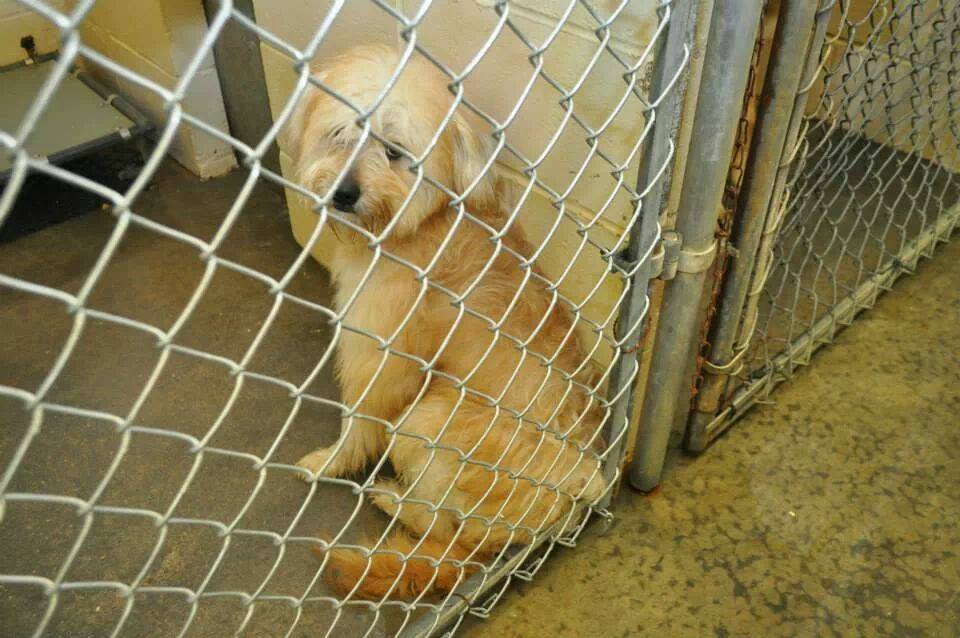
Source: Pinterest
Puppies, cute as they are, can be hard work and expensive. You may feel that an older Goldendoodle would suit your lifestyle better and in that case, you could be one of the special people that give a rescue dog a second chance.
The significant increase in the popularity of this mixed breed has seen lots of hobby breeders and puppy mills cashing in and the problems associated with puppies from this kind of background ie: fear aggression, poor socialization, early separation from mum, destructive behavior are the main reason Goldendoodles end up in shelters not to mention allergy sufferers who have rushed out to buy one without the proper caution.
That being said, with time and patience many of these unfortunate dogs can and do make great pets for the right families. If you would like to adopt a Goldendoodle the best place to start is the internet. Join online groups and forums to get the message out there. Register with Goldendoodle rescues and check out sites like Adopt a Pet and Petfinder which showcase Goldendoodle rescue dogs from across the USA.
Admittedly it might take some time to find your perfect dog this way but the satisfaction it will give you knowing you have provided a loving home for an unwanted, perhaps neglected dog is well worth it.
How Much Will a Goldendoodle Set You Back?
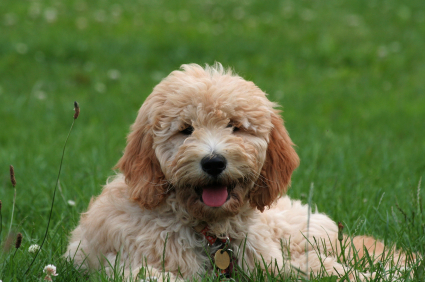
Source: Petwave
So, how much is a Goldendoodle? There are people who say hybrid dogs are not worth the exorbitant prices charged, after all, they are not even pedigrees. The fact remains, the best Goldendoodle breeders experience the same costs to breed a litter as other breeders, vet bills, worming treatments, premium food, whelping box, advertising, health screening, the list goes on. Also like other breeders they are dedicated to the welfare of their chosen mixed breed so it is perfectly reasonable they charge a similar price to pure-bred puppies.
A Goldendoodles Price may vary and yes you can find Goldendoodle puppies for sale on the internet at around $500 but a pup from a good breeder will set you back between $800-$3,000. You will pay more for a mini Goldendoodle, rarer colors, unusual markings and English pedigree lines in the parents.
All these things can be taken into consideration, but as an allergy sufferer the priority will be different, when you are looking for a Goldendoodle for sale, you will want a hypoallergenic dog breed that is right for you. Of course, Goldendoodle adoption is much cheaper you can expect to pay a fee of between $50-$300. Widen your search and prepare to be patient ensuring you find that perfect match.
It’s a Wrap
Doodles were originally bred for allergy sufferers and many of the Poodle mixes make great pets. Do Goldendoodles shed? sometimes yes, however not all Goldendoodles are the same and reactions may differ so it is vital you spend some time with your chosen canine companion and do your research to establish which generation is best for your level of allergy before bringing them into your home.
That being said, these happy, clever, beautiful, medium-sized hypoallergenic dogs are an excellent choice for the increasing number of American allergy sufferers and are 100% here to stay.

